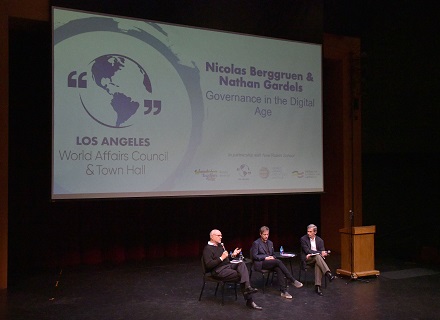
Nathan Gardels (L), Nicolas Berggruen, and Terry McCarthy (Moderator)
On October 14th, 2019, the Los Angeles World Affairs Council & Town Hall had the honor of hosting Nicolas Berggruen, founder of the Berggruen Institute, and Nathan Gardels, editor-in-chief of The World Post, for a discussion concerning democracy and governance in the digital age.
Berggruen and Gardels highlighted the ongoing crisis of government in liberal democracies all around the world, from the United States to Western Europe. They noted that the widening gap between elected representatives and the public, along with the steady rise of populism, were symptoms of the decay of trusted democratic institutions. These include news sources and spaces of public discourse, which have been completely dominated by social media in recent years. Although social media has the potential to stimulate “literal democracy in action”, it has often fallen victim to the proliferation of fake news and hate speech, which fundamentally endangers democratic systems. The negative effects of privatization on the “space of discourse” has led to calls for the breakup of big social media platforms such as Facebook, which Berggruen and Gardels cautioned against, citing new problems that could arise if countless small social media platforms suddenly emerged. They suggested an alternative proposal where social media companies would share revenue with trust media sources instead of third-party monitors, who have largely failed to contain the spread of misinformation and hate speech.
The discussion also touched briefly on the issue of automation and A.I., which the speakers believed would benefit society over the long run. The main issue revolved around navigating the transition period, which has displaced countless human workers from jobs that have been outsourced to robots. A potential solution involved giving everyone a stake in large tech companies, so that future generations can take ownership of robots instead of competing with them.
When speaking about China’s role in the world, Berggruen and Gardels urged the audience to come to terms with the reality that the Chinese system will not change anytime soon. They characterized China’s government as both repressive and responsive, meaning they pay close attention to dissatisfaction and internally reform after publicly silencing dissenters. The speakers mused that Chinese officials often behave similarly to their American counterparts as a response to the domestic pressures that they face. In addition, China has also made rapid technological advancements in artificial intelligence and surveillance, threatening America’s technological supremacy in the process. This development is especially critical now given the current vulnerability of democratic institutions across the world.
